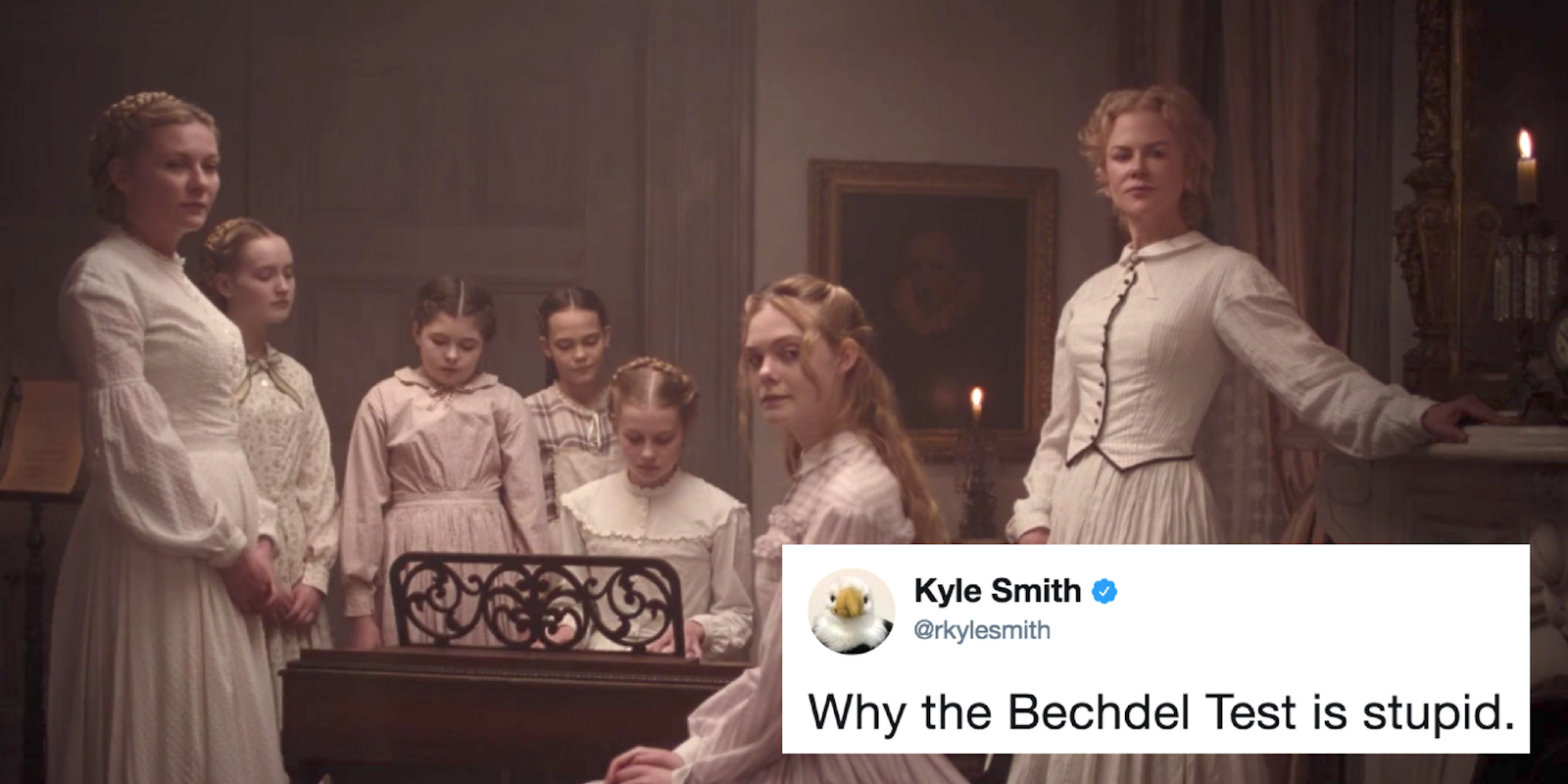Opinion
Sometimes movies that pass the Bechdel Test aren’t necessarily feminist movies. And movies that may be arguably pro-women or pro-girl power, don’t pass the Bechdel Test at all. Many women are well aware that just because a piece of art passes the test (by featuring two women who talk to each other about something other than a man), doesn’t mean the art is necessarily “feminist.”
This is not at all a foreign concept whatsoever.
However, it might be to someone who is hell-bent on discrediting women’s work, and the Bechdel Test metric for so much as existing. Perhaps that same someone would have been paid Very Real money to write a Very Bad essay titled, “If You Like Art, Don’t Take the Bechdel Test,” with the term “useless political correctness” speckling the post’s body and metadata.
In too many words, film critic Kyle Smith tells National Review readers that the Bechdel Test, a term coined from a 1980s comic, has no space in film critique, as it reveals nothing about the content of a film itself. He eloquently does so by imagining a world in which we judge films by a “cowboy” test—you know, a test that validates an existence of one or more cowboys in a film.
Smith then goes on to refute the argument that the test is “a strategy for drawing attention to the general way women are sidelined in Hollywood” by telling female filmmakers that they should write the next Lord of the Rings to make their work more palpable to filmmakers, promoters, and audiences of commercially successful films: men.
“… Movies aren’t intended to be a proper demographic cross-section of America. Movies (at least Hollywood movies) are about people on the extremes of society — cops, criminals, superheroes. These extreme characters tend to be men, and men tend to be the ones who create them. Women enjoy much more prominence in the milieu of low-budget independent movies, where the stories are more focused on ordinary people with real-world problems, but those movies usually attract small audiences. It might be true that there would be more women prominently featured in movies if more women were writing and directing more movies. But it might also be true that the reason there aren’t as many women making films is that women’s movie ideas aren’t commercial enough for Hollywood studios.”
Understandably so, Smith’s opinion sparked reaction from Twitter, many critics taking issue with Smith’s already-exhausted thoughts on the Bechdel Test, and the almost Swiss cheese-like nature of the holes scattered throughout the rest of his argument.
one of the funniest takes ive ever seen:
— chloe sargeant (@chlosarge) July 11, 2017
NRO 1) compares the bechdel test to lack of cowboys
2) acts like bechdel (made in 1985) is new https://t.co/EJuZJ0ft1d
https://twitter.com/MaryMarionberry/status/884528619556569088
https://twitter.com/JamColley/status/884582603470143488
Women are our default caregivers bc men like Kyle Smith are rewarded for acting like babies. So embarrassing. https://t.co/FXqtbijksQ
— joanna schroeder (@iproposethis) July 10, 2017
Ha. @NRO doesn’t understand the Bechdel Test and uses “currently” as if it weren’t a 30-year old concept. https://t.co/HiBADtrtwk
— Josh Resnick (@mr_resnick) July 11, 2017
https://twitter.com/RickyRawls/status/884495971815759873
https://twitter.com/ben_geier/status/884740321388769281
This has to be dumbest thing I have read in a long long time. Where do I start?! that Cowboys don’t make up 50% of the population maybe? 🤔 https://t.co/P6gIM3LADz
— AlwynHamilton (@AlwynFJH) July 11, 2017
like, really though?
— . (@disco_socialist) July 11, 2017
this sounds like “the bechdel test made me think AND I DO *NOT* LIKE THAT!” https://t.co/bGIfFF5Yju
https://twitter.com/HannaFlint/status/884549930525876225
“Have a wander through the sci-fi & fantasy section of your local bookstore: How many authors are female?” Many https://t.co/jZTVY7aagt https://t.co/yQT5RD28ss
— Steve Rhodes (@tigerbeat) July 10, 2017
The basis of this argument, that the Bechdel Test provides zero context of a film, is de facto incorrect. It assesses the validity of three parameters of a film (number of female characters, female characters speaking to one another, content of female character’s dialogue), and does tell us something about general representation of women in film.
Additionally, Smith’s argument has been validated by critics before. Yes, the Bechdel Test might greenlight films like American Pie 2 and Ferris Bueller’s Day Off, while the Hurt Locker does not pass. Does this disapproval necessarily mean that the latter film is objectively bad, or even worse than the former? Absolutely not. Even Alison Bechdel, the comic creator of the metric’s namesake, has said if she limited herself to watching Bechdel Test-approved movies, her entertainment options would be limited.
Despite this apparent agreement, Smith’s initial “cowboy” hypothetical and further explanations make his point greatly misguided, immature, and arguably sexist. To suggest that women’s interests or ideas aren’t “extreme” enough and the reason fewer female projects are successful in the first place is completely laughable.
Yes, Smith entertains for a sentence the idea that a male-dominated industry may be a hinderance to women, but his solution is for women to change their game. He fails to acknowledge the validity of Hollywood’s systemic sexism, how historical precedent has favored work from men—depicting stories of men and sending that work to the box office because of the decisions of men.
Who the hell are the pregnant, abortion-seeking Donna in Obvious Child, the gangly, undercutting Andy Sachs in the Devil Wears Prada, and the murderous Amy Dunne in Gone Girl if not “people on the extremes of society?” Their stories follow a hero’s journey of falls and triumphs, not unlike any of Smith’s favs: “cops, criminals, superheroes.” To discount a female character’s ability to fit these truths would be to discount women, literally half the population, as a whole.
Smith’s urgency to discount the Bechdel Test might be supported by self-proclaimed feminists in film, but his sexism-rooted reasoning is an example of why we need benchmarks like the test to check Hollywood’s male-dominated culture in the first place.


